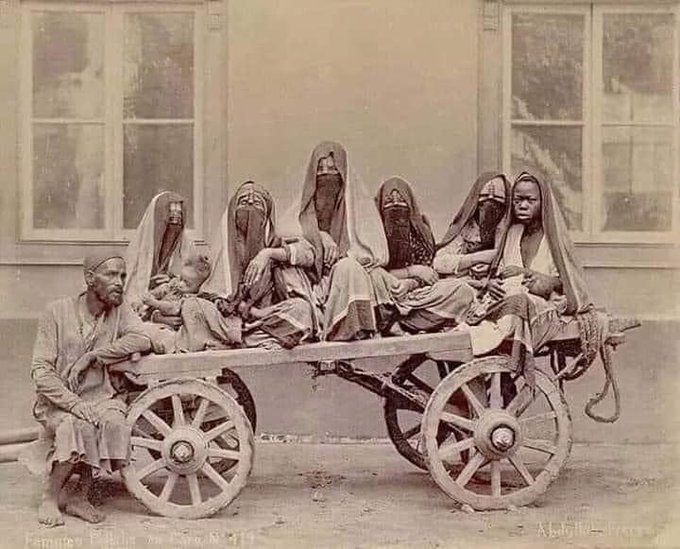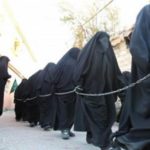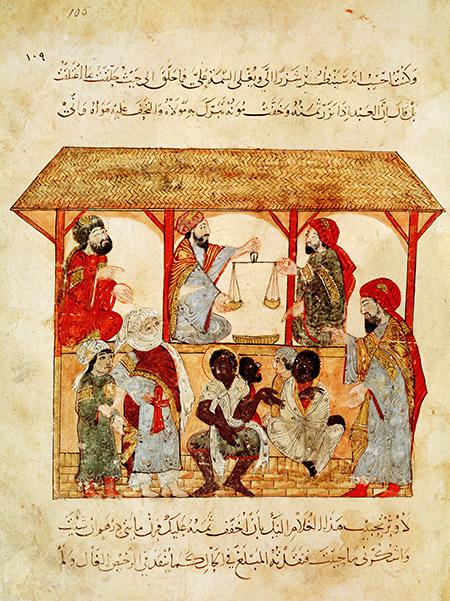
Let us first acquaint ourselves with the definitions of sabī and jihād. According to the dictionary sabī, jurisprudentially speaking, is the amassing of combatant infidel enemy women and children taken in war. Sabī as a noun has the plural sabāyā and means ‘imprisoned’. As for jihād the word comes from the verbal root jāhada and strictly speaking denotes ‘exerting effort’ to attain a required goal.
BY YUSUF YUSUF
IN SHARĪ‘A IT HAS two aspects: collective and individual. The collective aspect is to do one’s best to remove everything that calls for opposing God’s guidance (i.e. disbelief and sinning), and includes jihād against one’s self, one’s passions and against Satan. Under this category comes repudiation of doubts about what has been said about God and then there is the jihad against the infidel and the hypocrites by means of argumentation and demonstration. As for jihad in its individual sense, it is fighting the infidel – the polytheists and the People of the Book[i] until they enter into Islam or pay the jizya tax while in a state of subjection.[ii]
On the subject of jihād I will content myself with mentioning just the following verse:
Surely those who believed and those who fled (their home) and strove hard in the way of Allah these hope for the mercy of Allah and Allah is Forgiving, Merciful.[iii]
The explanation of the verse according to al-Ṭabarī is the following:
Those who fled and strove hard in the way of Allah – that is, those who turned against the domination of the polytheists by migrating away from them, and from fear of their sedition against their religions, and who fought against them for the religion of Allah so as to bring them into it and what pleases Allah these hope for the mercy of Allah – that is they crave that Allah will have mercy on them and cause them to enter into His Paradise by virtue of His mercy on them; and Allah is Forgiving – that is He covers over the sins of His servants by pardoning them, and favours them with His mercy.
Is it logical that Allah should say, while the religion of Islam was being spread: “insult women and enslave young boys and children”?
With regard to captives, I will cite the following verse:
All married women (are forbidden unto you) save those (captives) whom your right hands possess. It is a decree of Allah for you. Lawful unto you are all beyond those mentioned, so that ye seek them with your wealth in honest wedlock, not debauchery. And those of whom ye seek content (by marrying them), give unto them their portions as a duty. And there is no sin for you in what ye do by mutual agreement after the duty (hath been done). Lo! Allah is ever Knower, Wise.[iv]
Its interpretation according to the Islam Web online site is that
At the battle of Ḥunayn God’s Messenger sent an army to Awṭās, and they met an enemy and fought with them. Having prevailed over them they took captive the wives of the polytheists, and the Muslims were reluctant to have sexual intercourse with them. Then God revealed regarding that the verse: save those (captives) whom your right hands possess, that is, these women are permitted to you if their ‘idda period has expired.[v]
In this regard, and according to my modernist reading of the concept of ‘jihād for the sake of captives’, I will pass over what the commentators and jurists have said about the reasons for the revelation of, and the interpretations of, the above verse. This is not out of necessity, since the sources for this are plentiful. I will give my own reading of a concept such as this which has caused innumerable woes in this present age, not only for the nation of Arabs and Muslims, but also for the West.
If it were a jihād for the sake of Allah, and for the sake of His Word, and for spreading the religion of truth, is it logical that Allah should say, while the religion of Islam was being spread: “insult women and enslave young boys and children”? Does Allah command save those (captives) whom your right hands possess, i.e. that these women are permissible for you if their ‘idda period has expired? What sort of God is this who commands one ‘to exert effort in fighting the infidels of the polytheists and the People of the Book until they enter into Islam or pay the jizya tax while in a state of subjection’ while these are all His servants, and He is their supreme Lord?
What is most remarkable is that the Prophet did not wait for her ‘idda period
The Prophet took captive women. He enslaved the Jewess Ṣafiya bint Ḥuyyay, who was a stunning beauty and ‘at the time of the taking of the fortress of Khaybar her father and her husband Kināna ibn Abī al-Ḥaqīq were killed; she was one of the prisoners taken, and the Prophet selected her out … and even while still on the road she was prepared by Umm Salīm and given to him that night.’[vi] What is most remarkable is that the Prophet did not wait for her ‘iddaperiod (‘these women are permitted to you if their ‘idda period has expired’). He married her while they were on the way back without waiting, contrary to the provisions of the Qur’ān. (Clearly the commentators and jurists had some patching up to do for this transgression! It is also clear from this incident that the Prophet permits for himself what is not permitted for others).
I would like to quote a hadith by the Messenger of Islam concerning jihād:
Al-Miqdām ibn Ma’dikarib narrated that the Messenger of God said, “The martyr has six things (in store) with Allah: He is forgiven from the first drop of his blood that is shed; he is shown his place in Paradise; he is spared the torment of the grave; he is kept safe from the Great Fright; he is adorned with a garment of faith; he is married to (wives) from among the wide-eyed houris; and he is permitted to intercede for seventy of his relatives”[vii]
What interests me in this hadith is that Muḥammad implicitly gives his fighters to understand that if they are killed, and thus deprived of spoils and captive women in this worldly life, then Allah in the Hereafter will marry them with the wide-eyed houris. The question is whether Allah thus abandons all his worldly and heavenly tasks, and simply prepares 72 wives for each of the dead. What is noticeable in the terms sabī (‘captive women’) and ḥūr al-‘ayn (‘wide-eyed houris’) is the implication that Allah is providing those who fight with sexual temptations – whether female captives or wide-eyed houris. This is an irrational position for a divinity.
The implication that Allah is providing those who fight with sexual temptations is an irrational position for a divinity
The shaykhs of Islam have issued fatwās for an innovative, vice-ridden and despicable jihad, namely the marriage jihād, when they made this issue permissible for Islamic terrorist organizations, who began to engage in sexually ravaging women as if they were prostitutes, and exchange them among themselves – a subject of shame for humanity and the faith alike. The shaykhs actively promoted this jihād, in order to provide ease for the fighters in terrorist organizations such as Al-Qaeda and ISIS.

Suggested Reading
From my reading on the issue, along with taking into account all the above-mentioned verses, hadiths and interpretations, I see that:
(1) Jihād is a worldly concept and cannot be divine, since Allah is the Lord of all mankind and not the Lord of the Muslims alone. It is not possible for Allah to command the jihād of Muslims against the rest of His believing servants;
(2) The Islamic jihād has end purposes which include the seizing of others’ lands, the looting of their wealth, the enslavement of their women and the enslavement of their young boys and children. The dissemination of the da‘wa is effectuated by the above, and if genuine da‘wa takes place it is a mere formality because the process is actually by the sword;
(3) With regard to how Islam is to be propagated, this cannot be done by the sword or by threatening the imposition of the jizya tax. Islam can be propagated via missionaries, for the sword does not make a religion and cannot bring believers together;
(4) It is sex that remains the historical engine of jihād for enticing fighters with captive women and the ḥūr al-‘ayn;
(5) The verses on jihād and captive women are historical verses that are now otiose due to the changes that have occurred in place and time. The shaykhs, Islamic parties and Islamic terrorist organizations should know that Islam simply cannot be valid for all times and all places.
[i] Non-Muslims who are adherents to faith which has a revealed scripture. See Glossary: ‘Ahl al-Kitāb’.
[ii] The author refers to the authority of Shaykh ‘Abd al-Raḥmān ibn Nāṣir al-Barrāk for the above definitions, which may be read here. The Qur’ānic authority for this is Qur’ān IX (al-Tawba), 29: Fight those who do not believe in Allah, nor in the latter day, nor do they prohibit what Allah and His Messenger have prohibited, nor follow the religion of truth, out of those who have been given the Book, until they pay the tax readily and they are in a state of subjection. For a discussion on this see Almuslih article: “There is no compulsion in religion”. (Ed.)
[iii] Qur’ān II (al-Baqara), 218.
[iv] Qur’ān IV (al-Nisā’), 24.
[v] The ‘idda is the period that sexual intercourse is prohibited following a woman’s divorce or widowhood, divorce in this case being imposed upon the captive woman. Sample hadith texts on this may be read here, here and here.
[vi] Abridged citation from the الرحيق المختوم website.
Main image: The slave market in Istanbul from a 19th century photograph

